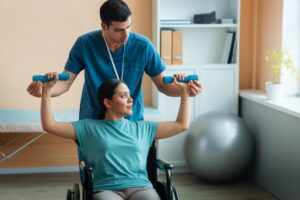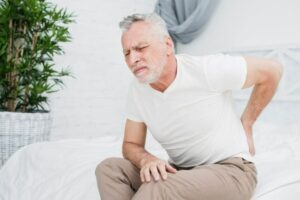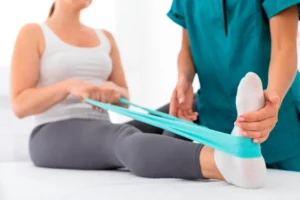Aging is a fact of life and it affects all families. As adult children, when imagining our parents as seniors, we may not fully comprehend the extent to which their aging will affect them or how it will affect us. However, the time does come when effects of aging become more evident and long-term care may be needed.
Care for the elderly means considering a family member’s emotional, mental and physical well-being. Essentials, necessary for dignity, physical and emotional well-being of our elderly parents and grandparents is to ensure their daily living requirements are met effectively.
One of the most important aspects of Elderly care is encouraging our elderly to embrace a regular exercise routine. Regular exercise, involving around 150 minutes of moderate activity can help in optimising physical and mental aspects of everyday life.
In short, the rotator cuff is the reason that one can have effective usage of ones arms.
Physical Health Benefits
Maintaining and losing weight – As metabolism naturally slows with age, maintaining a healthy weight is a challenge. We must encourage our elderly to embrace a regular exercise routine. Exercise helps increase the metabolic rate and builds muscle mass, helping to burn more calories. It also helps the body and mind operate at optimum thereby delaying the effects of ageing.
Reduces the impact of illness and chronic disease – People who exercise tend to have improved functioning of immune and digestive systems, optimal blood pressure and bone density as well as a lower risk of Alzheimer’s disease, diabetes, obesity, heart disease, osteoporosis, and certain cancers.
Enhances mobility, flexibility, and balance – Exercise improves muscular strength & flexibility and posture, which in turn will help to enhance overall balance, coordination thus reducing the risk of falls. Strength training also helps alleviate the symptoms of chronic conditions such as arthritis.
Mental Health Benefits
Improves Sleep and Rest Patterns – Regular activity helps to fall asleep more easily, remain asleep more deeply, and wake up feeling more energetic and refreshed.
Boosts mood and self-confidence – Exercise is a huge stress reliever and the endorphins produced can actually help reduce feelings of sadness, depression or anxiety. Being active and feeling strong naturally helps one feel more self-confident.
Energizes the brain – Following an exercise routine combined with mental activities like Sudoku or crossword puzzles can help keep the brain active, and prevent memory loss, cognitive decline, dementia and Alzheimer’s disease.
In our care for our elderly, we need to understand their optimum efficiency. The following are some important aspects that we need to consider
- Self – Feeding
- Functional Mobility
- Dressing
- Installing Grab Bars and Railings in the bathrooms to ensure easy support.
- Personal Hygiene
- Installing of ramps or stair climbers wherever required at home.
- Improved lighting in dim areas
- Involvement in their medical care
- Looking out of signs of emotional stress or depression and quickly mitigating the same.
Building a Balanced Exercise Plan for our elderly
A balanced exercise plan should be based on the four building blocks of fitness. These are
Balance – It maintains comfortable standing and stability during transitions for eg:- improved quality of sit to stand transition. Yoga, Tai Chi and posture exercises help them gain confidence with balance. It improves posture and quality of walking thereby reducing the risk of falling.
Cardio Vascular Endurance – Large muscle groups are required to be used in rhythmic motions over a period of time. It includes activities such as walking, stair climbing, swimming, hiking, cycling, rowing, tennis and dancing .It helps lessen fatigue ,promotes independence by improving endurance for daily activities.
Strength and power training – It builds up muscle with repetitive motion using weight or external resistance from body weight, machines, free weights, or elastic bands. It helps prevent loss of bone mass, builds muscles and improves balance.
Flexibility – It challenges the ability of your body’s joints to move freely through a full range of motion. This can be done through stationary and basic muscle stretches . Yoga is an excellent means of improving flexibility. It helps your body stay limber and increases your range of movement..
Helping our Seniors age gracefully is the least that we can do for all that they have given us. Exercise is a good place to start.




